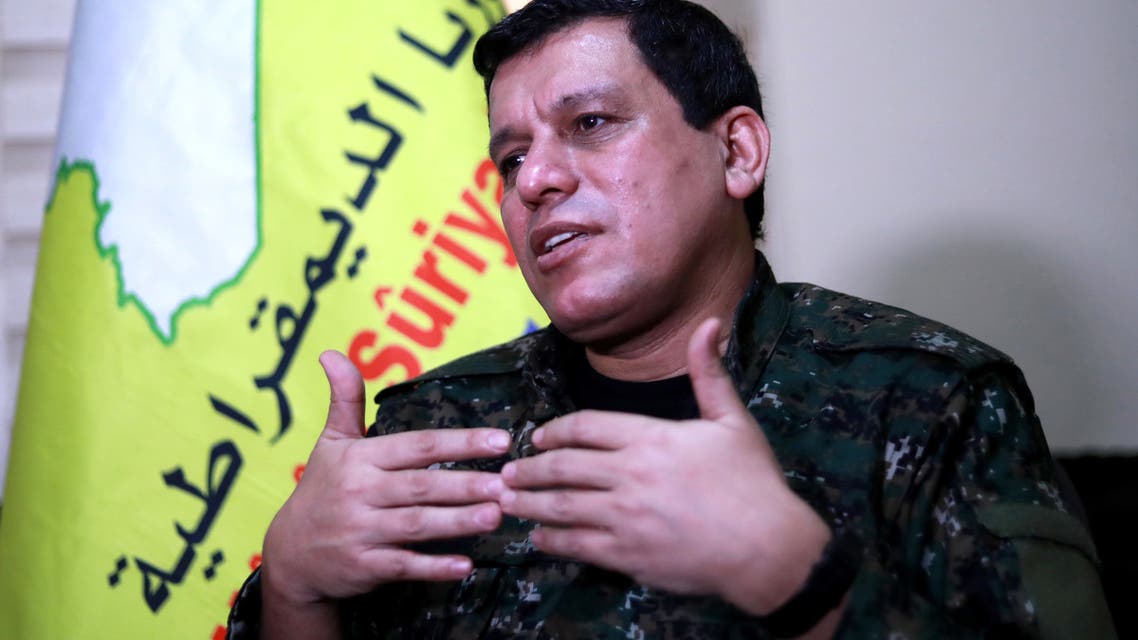Security and economic stability is inseparable from ISIS combat: Mazloum Abdi
WASHINGTON, US (North Press) – On Thursday, the Commander-in-Chief of the Syrian Democratic Forces (SDF), Mazloum Abdi, said that his forces are strategically patient and did not escalate with Turkey on the border, despite its violation of the truce, and that they are continuing the intra-Kurdish dialogue and other communities.
He considered that improving the economic situation in northeast Syria is inseparable from the fight against the Islamic State (ISIS).
Abdi’s speech came when he was hosted in a virtual seminar held by the Washington-based Newlines Institute for Strategy and Policy.
Abdi said that no escalation or penetration of the border with Turkey took place during the nine years of his forces’ control over north and east Syria.
He added that they are trying to show strategic patience and not to escalate despite Turkey’s violation of the truces, especially the truce sponsored by Mike Pence, the former US Vice President in 2019, as any escalation in the region will ultimately benefit ISIS, where the activity of its sleeper cells is currently increasing in the east of the country and on the Syrian-Iraqi border.
Abdi noted to special efforts and moves made by the administration of the US President Joe Biden to pressure the Turkish side to stop the escalation and the recent Turkish attacks on the region.
From August 12 to early September, the Turkish forces escalated their targeting of villages and towns north of Hasakah, killing and wounding dozens of civilians and SDF members amid frequent shelling on the countryside of Hasakah, Manbij and Ain Issa, causing partial displacement from some villages.
Stabilization
“We do not want the American forces to remain in Syria forever. Our determination to fight extremism will not be affected by the American presence or absence, especially since we started fighting ISIS before our partnership with the US, but the military victory we have achieved deserves to be consolidated with political stability, and our friends in the US can help in this,” Abdi said.
He pointed out that the bombing of ISIS Khorasan in Kabul, which killed 13 US soldiers and dozens of Afghan civilians, revived the hopes of ISIS and al-Qaeda in Syria to return to terrorist attacks.
“The extremist groups of al-Qaeda and ISIS morally benefited from the US withdrawal from Afghanistan and the feeling of the Taliban’s victory. In Idlib, there were celebrations for days carried out by al-Qaeda, which considers the Taliban’s victory as a victory for it. And ISIS, with its sleeper cells in areas of northeast Syria started to send threats and messages to the local population which said that the organization is returning and the US withdrawal from Syria is imminent.”
However, the SDF commander considered that the facts confirm on the different situation between Syria and Afghanistan. Despite the great concern created by the withdrawal from Afghanistan in north and east Syria, the shape and impact of the American presence are also different, in addition to the fact that American officials confirm their intention to continue to stay in Syria until full security stability is established in the region.
Intra-Kurdish dialogue
Abdi mentioned that the intra-Kurdish differences are another reason that affects the destabilization of the region, noting to the continuation of the Kurdish parties in the national dialogue between the various communities, as the Kurds have gone a long way in this dialogue despite the continuing crises in northern Iraq, which negatively affect all Kurdish regions.
The commander expressed his hope that the escalation in northern Iraq would be halted, because it is a prerequisite for the success of the intra-Kurdish dialogue, “which is urgent in this period, for the first time in 20 years, there are serious fears of intra-Kurdish clashes that we had succeeded in avoiding and preventing over the past two decades.”
He also urged Washington to participate in supporting the intra-Kurdish dialogue and ways of rapprochement and ending differences.
Economic challenges
In his exclusive interview with Newlines Institute for Strategy and Policy, Commander Mazloum Abdi stressed the importance of addressing the economic challenges in north and east Syria as a prerequisite for ensuring stability and defeating extremism and terrorism from the region.
Abdi stated that the area from which ISIS was expelled has become completely destroyed, including its infrastructure which is suffering from a complete collapse, the matter negatively affects the security situation in the region.
While ISIS is trying to take advantage of the deteriorating economic conditions in its activities to recruit and attract young people to fight.
He pointed out that there are 12,000 detainees of ISIS families and former fighters in the region, most of whom are sympathetic to the extremist organization, “and all of this requires stepping up work on rehabilitation programs and strengthening the economy of the region to ensure a sustainable stability.”

